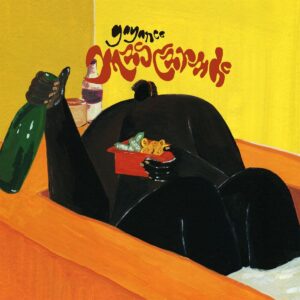By Stephan Boissonneault
With There Is Nothing In The Dark That Isn’t There In The Light, the veteran vocalist leans into intimate, searching folk.

Mascarade cover art: Bahati Simoens
“There is a sense of sharing in the way that I have a number of collaborators. For sure I’ll be the leader, but I have a number of people I share with in the studio. For example Janette King, Hua Li, Judith Little D, David Ryshpan,” she says. “I like collaborations, I think two heads are better than one. It also helps shifting perspectives, so it’s always good.”
Although music has been woven into Gayance’s life since her childhood, she only started practicing music professionally while in the solitude of lockdown. “When the world stopped, classic story as everybody says, I decided to sit down and to really get serious about it,” she says.
Hence Mascarade, Gayance’s first album, and its rather introspective themes. The songs rewind in different moments of Vertus’ life, navigating failed romances, her family story, and living far from loved ones. Mascarade’s titles combine these personal and melancholic topics with broken beats, as well as house and R&B sounds that will make your body move without realizing it.
Her album’s title was decided on a scenic and fateful evening. “The title was supposed to be something along the lines of Origin Story, but on a sunset day in Rio … I was walking and there were people singing my favourite carnival song, which is also the last song I shared with my grandfather before he passed away and I thought, ‘You know what? This whole life, this whole thing, it’s all a masquerade, she says.
And so she went along with the title Mascarade, in reference to the carnival in Caribbean and Afro-Latino cultures. “Carnival is really the only place, I feel, where people dress up and all that, but also they are purely themselves,” she says. It’s also a way for them to protest. That’s really what the masquerade is for me, the carnival and everything, without necessarily having made carnival music, but it’s an element that inspired me a lot.”
Vertus’ artistic project celebrates her Haitian origins, and she chose her stage name accordingly. Gayance means joie de vivre in Haitian creole, and it seems to embody both her roots and her values: living joyfully and bringing others along in this effusive sentiment. It is easy to pinpoint her love of sharing when interacting with her and her art, even regarding more vulnerable topics.


While doing research on Gayance, I stumbled upon her YouTube channel. One of her videos stood out in which she prepares a DNA sample to uncover her origins, obliterated by colonization and slavery. She never posted her results, so I asked her what came out of them.
Vertus, who found out she is part West African, part European, takes the opportunity of her results to talk about biraciality. “There is a fetish for people with that kind of mixed background everywhere. Like the Kardashians want to look like they are mixed race,” she says. In fact, she points out, biraciality in the Caribbeans could have stemmed from non-consensual relationships.
On a brighter side, her results might surprisingly explain her love for Brazil. For a decade, Gayance has been going there for three months each year. For Vertus, Brazil is a second home to which she pays homage by singing in Portuguese and sampling samba songs in her music. “My African side was mostly from Nigeria,” she explains, “so that’s why I felt at home in Bahia, Brazil, because they are Yoruba from Nigeria. So maybe I am Yoruba. We don’t know.”
Gayance expresses that multiplicity of home and found home in an upcoming experimental short film, shot between Brazil and Quebec. The entirety of Mascarade’s songs will be featured in this eponymous visual project. Again, Vertus insists on the collaborative aspect of the film. She co-wrote and directed with Maïlis Roy-Lessard, and also mentions Antoine Ryan’s “truly impeccable” direction of photography. “We worked with incredible artists, both in Brazil and in Quebec. It’s also a message that you can work with a diverse team, with many women in charge.” She makes a point of collaborating with women, gender minorities and people of colour.
Gayance does not just intend on bringing people together, she actually and very simply does it, and for good reasons. “I think it’s important to stand up for what we believe in,” she says, “Because it can affect more than just us. It can affect different people who don’t know how to talk, who can’t talk, so why not do it?”
By Stephan Boissonneault
With There Is Nothing In The Dark That Isn’t There In The Light, the veteran vocalist leans into intimate, searching folk.
By Sam Hendriks
A refined turn toward clarity reveals Melody Prochet at her most grounded and assured.
By Judynn Valcin
Inside the Montréal musician’s shift toward ease, openness, and a sound that refuses to collapse even as it teeters.